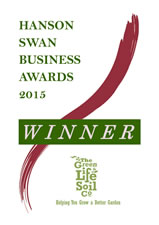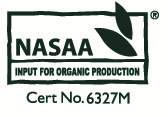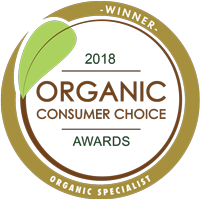| item(s), Total: $0.00 View Cart |
| Shopping cart is empty. |
April was a very busy month with the Perth Garden Festival - I hope if you went along this year you enjoyed it? Official numbers were 36,000 attendees over the 4 days, and we were lucky with the weather - a few slight showers on the Sunday didn't seem to scare people off (I guess gardeners are usually not put off by a bit of rain!). Thank you to everybody who came and said hello, and took advantage to stock up on some bits and pieces for their garden. In case you haven't figured it out yet - at Green Life we're a bit passionate about SOIL - it is a living thing (or at least it should be!) More and more is coming to light now about the importance of healthy, microbially active soil, and why biodiversity is so important. This goes so very deeply - obviously it affects plant health in your own garden, but on a much bigger scale there's broadacre farming and the implications that has on food production & feeding populations which goes to healthy societies and political stability and so on... So while that may seem a stretch - it's what we truly believe in here - that everything starts with the soil. So if you're looking at your little patch and need help to make it better - do come and see us, because we know we can help. This month, we've got an article on how to rejuvenate your garden this Autumn; I hope it's useful.
We've also got our popular Propagation workshop THIS SUNDAY (5.5.19) - always a popular session, it's hands on and informative! Check out the link here for full details/times/price & booking information. It's designed at a fairly basic level for new gardeners, or for those who lack skills and confidence in growing their own plants, and would like help to have more success with germination, and cuttings. The class will give you lots of opportunity to try things for yourself (you'll get to take goodies home), and ask questions directly to Leesa (from The Greenhouse Organic), who runs the workshop. So We hope to see YOU soon @ GLSC. Happy Autumn gardening! In this newsletter:Jobs for the May garden Jobs to do in the May garden
What to Plant NOW
Check out our free downloadable planting guides here - remember there's one for your vegies & another for herbs. Here's a link to our popular companion planting guide & crop rotation guide too. Feel free to share! Some ideas for vegies/herbs to consider now are: Artichokes (Globe), Asian greens, Beetroot, Broad Beans (pictured right), Broccoli, Cabbage, Carrots, Cauliflower, Celery, Coriander, Dill, Garlic, Kale, Kohl rabi, Leek, Lettuce, Onion, Parsnip, Peas, Potatoes, Radish, Silver beet, Snow peas, Spinach, Spring onion, Strawberries, Turnips. Unfortunately at GLSC we've sold out of garlic for the season; but if you can get your hands on any locally grown bulbs it's worth putting them in ASAP. We DO still have our Certified Organic Seed Potatoes available (three varieties) so come and get them while you can. If you've never grown Broad Beans; why not give them a go this year? Don't be put off by the horrible things you find in the shops - they're picked FAR too big/old and tough - fresh & home grown broad beans picked young are amazing. You can even pick the growing tips of the plants and use them steamed like a vegetable; so they're very versatile. Here's some growing information on Broad Beans for you (click here). Rejuvenating your gardenOn a daily basis, we get customers through our door that are lamenting they "can't grow" things, or that other soil issues affect their garden's health. In Perth, most of us struggle with nutrient poor, sandy soils, which are water repellent (especially at the end of a long summer) and lifeless. To have a great garden you need to address the soil (everything starts with the soil, remember?). There are three elements you need to consider - and we'll explore them below. It is always easier to grow in Perth in Autumn & Winter, as the conditions are mildest and natural rainfall certainly helps things thrive. The best way to make sure your garden struggles less next summer is to do the work NOW to build your soil health. Whether you're planning on growing vegies, or looking to establish new plants in a more permanent garden area, here are some things you need to address for the best results. Soil Structure (physical soil health)
Nutrition (chemistry of soil health)
In Autumn, adding compost, small amounts of aged manure, rock dust, blood and bone, potash ~ NOT necessarily all of these at once, by the way! will provide a range of nutrients to your garden. How much to add can depend on what you're growing (fast growing crops like vegies need more, for example); and take into account your previous soil management. Over fertilising your plants can lead to problems too. Observe your garden's health - plants will tell you when they're hungry! Adding organic matter to very sandy soil without addressing the soil structure can be disappointing - compost & manure will break down very quickly in open, sandy soils and ultimately add to water repellency in some instances. To overcome this, use a good quality soil wetter but then address the soil structure. If you do it properly you'll only need to do it once. Soil Microbes (biological soil health)
VIP Special Offer
This month, spend over $50 with us and receive a 25L bag FREE. For in store customers and phone orders - please remember to ask for the VIP deal. Online customers - please add "free poo VIP special" in the delivery notes section of your order. Our quality poo is great to incorporate into your garden beds to provide organic matter & give plants a feed; it's also great to add to your compost piles and worm farms! Offer valid one per purchase until COB 31.5.19. Photo Competition Winner
We look forward to seeing how it all works for you, Rhys! Thanks for sending in the photos & you've won a $50 voucher to spend with us. See how easy it is? Just send us your garden pics via Facebook or email with a line or two about what you're doing in the garden and it might be YOU next month!!! Retail Stockist Update
|

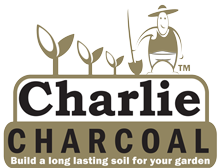

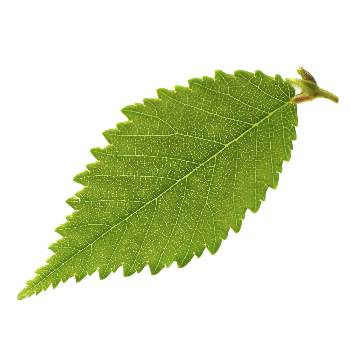 Hello & welcome to MAY! We trust you had a good Easter/school holiday/ANZAC period - many people had an extended break and for some that meant it was a good time to get things going in their garden. If you've been too busy and doing other things - it's not too late. NOW is the perfect time to get growing; the days are mainly sunny and warm and there has been a teasing amount of rain - let's hope there's more to come (although during the week and/or at night time is our request - should anybody be listening!)
Hello & welcome to MAY! We trust you had a good Easter/school holiday/ANZAC period - many people had an extended break and for some that meant it was a good time to get things going in their garden. If you've been too busy and doing other things - it's not too late. NOW is the perfect time to get growing; the days are mainly sunny and warm and there has been a teasing amount of rain - let's hope there's more to come (although during the week and/or at night time is our request - should anybody be listening!).jpg) Speaking of soil & environmental health - for those of you that are in the City of Swan area, on Thursday, 30th May at Midland Town Hall there's a FREE event (
Speaking of soil & environmental health - for those of you that are in the City of Swan area, on Thursday, 30th May at Midland Town Hall there's a FREE event (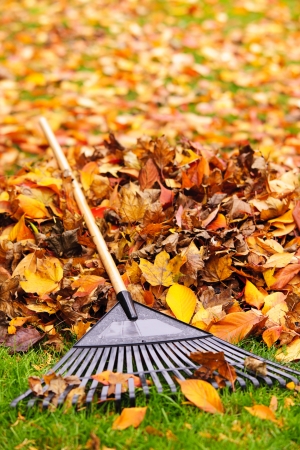 Compost! It's the perfect time to gather leaves (when the deciduous trees begin to drop them), and put through any prunings (from tidying up perennials, etc) through your mulcher. If you're a keen gardener a mulcher is a useful tool - of course things will still compost down, but it helps get rid of the twiggy element in your compost, and smaller particles assist decomposition. My advice is to buy a bigger/heavier duty one than your first impulse (providing you can afford it) as I guarantee bigger sticks will jam small ones and you'll discover more of those than you thought you had! If your compost has been a bit dry and inactive over summer, turn it, and provide more moisture to get it cranking again.
Compost! It's the perfect time to gather leaves (when the deciduous trees begin to drop them), and put through any prunings (from tidying up perennials, etc) through your mulcher. If you're a keen gardener a mulcher is a useful tool - of course things will still compost down, but it helps get rid of the twiggy element in your compost, and smaller particles assist decomposition. My advice is to buy a bigger/heavier duty one than your first impulse (providing you can afford it) as I guarantee bigger sticks will jam small ones and you'll discover more of those than you thought you had! If your compost has been a bit dry and inactive over summer, turn it, and provide more moisture to get it cranking again. Slugs & Snails - like weeds, they seem to emerge from nowhere as soon as the rains come. Going out with a torch at night and squishing them is the most effective (and organic) way to control infestations. If you're too squeamish to squish - drop them into a bucket half full of hot water with a couple of tablespoons of salt to dispatch them.
Slugs & Snails - like weeds, they seem to emerge from nowhere as soon as the rains come. Going out with a torch at night and squishing them is the most effective (and organic) way to control infestations. If you're too squeamish to squish - drop them into a bucket half full of hot water with a couple of tablespoons of salt to dispatch them. 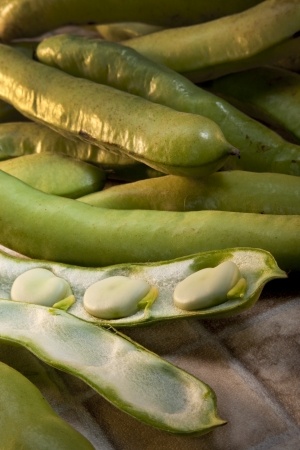 There's still time to get your winter vegies in - although seedlings will probably be your best option now. If you wish to grow from seed, get some started but keep them for your succession planting to follow on from seedlings you can get in the ground straight away. You'll be able to extend your harvest for longer that way.
There's still time to get your winter vegies in - although seedlings will probably be your best option now. If you wish to grow from seed, get some started but keep them for your succession planting to follow on from seedlings you can get in the ground straight away. You'll be able to extend your harvest for longer that way.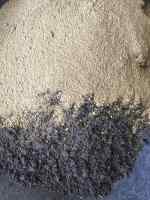 This comes down to what your soil is made up of - and we know that most of Perth deals with (almost) pure sand. Ideally, your should have soil that forms aggregates or peds - little particles that cling together but have spaces between them for water and air to penetrate. Our sandy soil lacks the ability to do this, unless we look at adding the other elements we need to create a good loamy soil - ie. clay and silt (which come together anyway). Most of Perth's sandy soil contains less than 2% clay; so increasing the clay content helps to improve soil structure, which for gardeners carries the benefits of water and nutrient retention - and this in turn creates the right environment to sustain microbial life, so there really isn't a negative involved here! As a bonus, clay is a mineral that doesn't really continue to break down (at least not quickly) so adding the correct volume of clay for your circumstances is a once-off effort. There are a number of clay products available (we carry bentonite clay, kaolinite clay (Cassies Clay) as well as the mineral mix Sand Remedy). Cassies Clay and Sand Remedy are both certified organic and Smart watermark/Waterwise accredited. There are pro's and con's to both commonly used types of clay, and we're happy to discuss the difference/s and recommend what will work best for your situation. There's also other articles on improving your sandy soil right
This comes down to what your soil is made up of - and we know that most of Perth deals with (almost) pure sand. Ideally, your should have soil that forms aggregates or peds - little particles that cling together but have spaces between them for water and air to penetrate. Our sandy soil lacks the ability to do this, unless we look at adding the other elements we need to create a good loamy soil - ie. clay and silt (which come together anyway). Most of Perth's sandy soil contains less than 2% clay; so increasing the clay content helps to improve soil structure, which for gardeners carries the benefits of water and nutrient retention - and this in turn creates the right environment to sustain microbial life, so there really isn't a negative involved here! As a bonus, clay is a mineral that doesn't really continue to break down (at least not quickly) so adding the correct volume of clay for your circumstances is a once-off effort. There are a number of clay products available (we carry bentonite clay, kaolinite clay (Cassies Clay) as well as the mineral mix Sand Remedy). Cassies Clay and Sand Remedy are both certified organic and Smart watermark/Waterwise accredited. There are pro's and con's to both commonly used types of clay, and we're happy to discuss the difference/s and recommend what will work best for your situation. There's also other articles on improving your sandy soil right 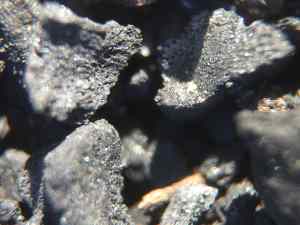 Adding Charlie Charcoal (biochar) is also something we'd highly recommend in our sandy soils. It works fabulously in conjunction with clay; they're complimentary in so many ways that we recommend 'both' instead of choosing between 'either'. Charlie Charcoal acts similarly to compost - acting like organic matter. Microbes will populate its porous surface but will not break it down further (unlike compost - which is why it disappears so quickly in your soil) - so biochar is also a permanent soil addition. It has the ability to hang onto a wider range of nutrients than clay and make them plant available, as well as it having the benefits of stabilising pH and to an extent helping with nutrient excesses that can be a problem in coastal soils (or those that have had excessive phosphorus supplied over the years with heavy handed manuring - a problem in our sandy soils). Pictured above right - close up of biochar particles.
Adding Charlie Charcoal (biochar) is also something we'd highly recommend in our sandy soils. It works fabulously in conjunction with clay; they're complimentary in so many ways that we recommend 'both' instead of choosing between 'either'. Charlie Charcoal acts similarly to compost - acting like organic matter. Microbes will populate its porous surface but will not break it down further (unlike compost - which is why it disappears so quickly in your soil) - so biochar is also a permanent soil addition. It has the ability to hang onto a wider range of nutrients than clay and make them plant available, as well as it having the benefits of stabilising pH and to an extent helping with nutrient excesses that can be a problem in coastal soils (or those that have had excessive phosphorus supplied over the years with heavy handed manuring - a problem in our sandy soils). Pictured above right - close up of biochar particles.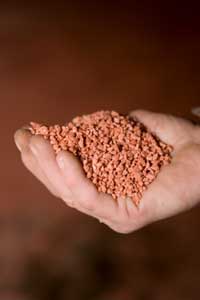 'Feed your soil' is the organic gardener's mantra. While your plants can't tell the difference between man-made chemical elements or an organic based form we believe there are important differences. Providing a range of slow release nutrients in an organic format provides a steady diet to your plants and builds a healthy soil life. Rather than dumping highly soluble nutrients which tend to leach through our sandy soils, minerals and composts need to be broken down by soil microbes to make the nutrients plant available. This doesn't happen overnight, but continues in the soil often for many months.
'Feed your soil' is the organic gardener's mantra. While your plants can't tell the difference between man-made chemical elements or an organic based form we believe there are important differences. Providing a range of slow release nutrients in an organic format provides a steady diet to your plants and builds a healthy soil life. Rather than dumping highly soluble nutrients which tend to leach through our sandy soils, minerals and composts need to be broken down by soil microbes to make the nutrients plant available. This doesn't happen overnight, but continues in the soil often for many months.  We're learning more and more all the time about the importance of living elements in our soil. A single teaspoon of soil can contain an estimated 4 BILLION living organisms... Isn't that mind blowing? There's a whole other world of birth/life/death that goes on in the microscopic soil food web. As discussed, microbes make nutrients plant available and play a role in plant health in other ways; so it makes sense to avoid using products in our gardens (pesticides, herbicides, fungicides) that have a detrimental affect on this living system. How do we promote a healthy soil biology? Microbes need the same things we do to survive - food, water and shelter! Microbes tend to populate the top few centimetres of soil for this reason (non co-incidentally where most plants have their feeder roots) so protecting the soil with mulch and promoting water holding by improving soil structure is critical. Here's as great article I found today if you'd like some further reading about plants & microbes working together.
We're learning more and more all the time about the importance of living elements in our soil. A single teaspoon of soil can contain an estimated 4 BILLION living organisms... Isn't that mind blowing? There's a whole other world of birth/life/death that goes on in the microscopic soil food web. As discussed, microbes make nutrients plant available and play a role in plant health in other ways; so it makes sense to avoid using products in our gardens (pesticides, herbicides, fungicides) that have a detrimental affect on this living system. How do we promote a healthy soil biology? Microbes need the same things we do to survive - food, water and shelter! Microbes tend to populate the top few centimetres of soil for this reason (non co-incidentally where most plants have their feeder roots) so protecting the soil with mulch and promoting water holding by improving soil structure is critical. Here's as great article I found today if you'd like some further reading about plants & microbes working together.  Microbes are in our soils all around us, and are in the soil with new plants we buy, and are in composts, manures, potting mixes - etc. It's almost impossible to know what kind of microbial life is present, but by providing them the right conditions you'll be helping them to thrive in their own balanced way. (A bit similar to building a bug hotel - you may never know what shows up but you're still providing habitat and supporting the natural food chain). There are some microbes that are detrimental (eg. root knot nematode) but by having a good range of soil biology you can achieve a balance; it is only when conditions promote a dominance of undesirables there are problems, so biodiversity is key. It is possible to buy microbe blends that you mix with water (we sell them in small sachets - pictured right), and there are several popular fertilisers available now that have microbes included in their formulation. It may be beneficial to use these products to add some previously unavailable biodiversity - but it is probably not essential. Plants have their own 'preferred' microbial buddies that they have evolved a symbiotic relationship with; some of the new strains may be completely unsuitable to your garden, and not thrive. It is impossible to know!
Microbes are in our soils all around us, and are in the soil with new plants we buy, and are in composts, manures, potting mixes - etc. It's almost impossible to know what kind of microbial life is present, but by providing them the right conditions you'll be helping them to thrive in their own balanced way. (A bit similar to building a bug hotel - you may never know what shows up but you're still providing habitat and supporting the natural food chain). There are some microbes that are detrimental (eg. root knot nematode) but by having a good range of soil biology you can achieve a balance; it is only when conditions promote a dominance of undesirables there are problems, so biodiversity is key. It is possible to buy microbe blends that you mix with water (we sell them in small sachets - pictured right), and there are several popular fertilisers available now that have microbes included in their formulation. It may be beneficial to use these products to add some previously unavailable biodiversity - but it is probably not essential. Plants have their own 'preferred' microbial buddies that they have evolved a symbiotic relationship with; some of the new strains may be completely unsuitable to your garden, and not thrive. It is impossible to know! 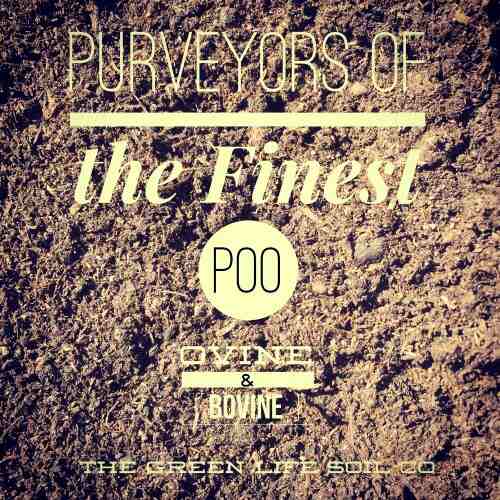 FREE POO FOR YOU! Our weed free blended sheep & cow manure is always popular with gardeners.
FREE POO FOR YOU! Our weed free blended sheep & cow manure is always popular with gardeners. 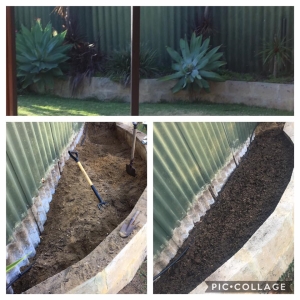 This month's winner is Rhys from Kardinya who sent us in these pictures via Facebook of the preparation of his new garden bed (before & after his hard work!) He commented: "The Veggie Concentrate looks the goods! Very hard work digging out the agaves and yuccas, but the former sandy bed is now ready for edibles! Thanks for your help Green Life Soil Co".
This month's winner is Rhys from Kardinya who sent us in these pictures via Facebook of the preparation of his new garden bed (before & after his hard work!) He commented: "The Veggie Concentrate looks the goods! Very hard work digging out the agaves and yuccas, but the former sandy bed is now ready for edibles! Thanks for your help Green Life Soil Co".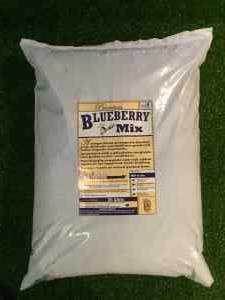 Looking for Green Life goodies closer to home? Check out our list of independent stockists. Please support these businesses who support us! You'll get great advice & local knowledge as a bonus.
Looking for Green Life goodies closer to home? Check out our list of independent stockists. Please support these businesses who support us! You'll get great advice & local knowledge as a bonus.







